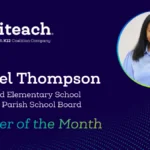As a new teacher, preparing for your first parent-teacher conference can feel daunting. However, these meetings offer a key opportunity to build strong relationships with students’ families and ensure everyone is aligned on student progress. Remember, you’ve earned this position through your hard work and dedication, and you are the best person to guide your students toward success. Own the stage and trust in your abilities as an educator. By being prepared, professional, and empathetic, you can transform these interactions into collaborative partnerships that benefit your students. Below are five add Parent-Teacher conference tips for holding a successful parent-teacher conference that will help you feel confident and empowered when communicating with parents.
1. Start with Positivity
A successful parent-teacher relationship begins with positivity, and you can lay the foundation for that at your upcoming conference. It’s important to start the conversation by sharing something the student is doing well—whether that’s their behavior, progress, or engagement in the classroom. When parents hear positive feedback first, they know that you care about their child as a whole. This will help set a welcoming and collaborative tone for the rest of the discussion, which will help when it comes time to address any challenges. By focusing on the student’s strengths first, you foster a supportive environment that makes parents feel more comfortable and engaged.
2. Come Prepared with Data
Preparation is key to a successful conference. Arriving with specific examples of student work, behavior, or assessments allows you to present a clear picture of the child’s progress. Tangible data, such as test scores, class participation records, or homework samples, provides parents with concrete evidence of where their child stands academically. Not only does this make the conversation more effective, but it also reassures parents that you’ve taken the time to understand and meet their child’s needs. Showing them that you’ve put in the effort strengthens your credibility and demonstrates your commitment to helping their child succeed.
3. Focus on Actionable Solutions
While it’s important to discuss any areas where a student may need improvement, the focus of the conversation should always be on finding solutions. Instead of highlighting problems, present challenges as opportunities for growth, and provide actionable steps that can be taken both at school and at home to support the student. For example, if a student is struggling with staying organized, you might suggest introducing a color-coded folder system in class while encouraging parents to help their child set up a similar system at home. Invite parents to share their insights and suggestions for what might work best for their child, such as adjusting the routine or using tools that are effective for them. This collaborative approach ensures that the discussion is constructive and that parents leave the conference feeling empowered to help their child move forward.
4. Listen and Show Empathy
Listening is just as important as speaking during a parent-teacher conference. Make sure to give parents space to express their thoughts, concerns, or questions. These conversations provide valuable insight into the child’s experiences at home and school, which can help you create a stronger foundation for their academic and personal growth. Showing empathy by acknowledging their perspective, even when it differs from your own, is key to building trust and fostering a positive relationship. Remember, this is also a learning opportunity for you as an educator, allowing you to better understand each student’s unique needs. When parents feel heard and understood, they are more likely to collaborate effectively with you. Empathy not only strengthens your bond with parents but also creates a foundation for long-term support that benefits the student.
5. End on a Positive Note
Just as you begin the conference with a positive tone, it’s crucial to close on one as well. Summarize the student’s strengths, and the action plan that you, and the parents have developed together. Reinforce your commitment to the student’s success and express gratitude for the parents’ involvement in their child’s education. Ending the conversation on a positive note solidifies the partnership between you and the parents, ensuring that everyone is on the same team, working toward the shared goal of the student’s success.
Parent-teacher conferences are more than just routine meetings—they are opportunities to build meaningful partnerships with your students’ families. By approaching these conferences with preparation, empathy, and a focus on solutions, you’ll strengthen relationships and create a supportive environment that nurtures student success. These interactions also provide you with valuable insights and learning opportunities that equip you with the tools to support your students even better, helping you grow as an educator while fostering their growth.
Ready to Thrive as a Teacher?
At iteach, we understand the challenges new teachers face, and we’re here to support you every step of the way. Our alternative certification program equips you with the knowledge and skills needed to thrive in the classroom. Apply today and start your journey toward becoming the teacher who makes a difference.





